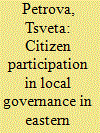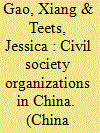|
|
|
Sort Order |
|
|
|
Items / Page
|
|
|
|
|
|
|
| Srl | Item |
| 1 |
ID:
079960


|
|
|
|
|
| Publication |
2007.
|
| Summary/Abstract |
The Shanghai Municipal Government's environmental complaints system allows citizens to report environmental problems to local authorities and provides timely feedback regarding how the complaint was resolved. Using both statistical data and case studies, we conduct a qualitative analysis of the system's costs and benefits as of early 2002. The analysis shows that the complaints system is an important, yet somewhat unreliable source of information about the many environmental problems not otherwise detected by regulators. Moreover, the opportunity cost of the system is significant; the system is dominated by nuisance complaints that are either trivial or without significance to environmental quality except at a very limited geographical scale. Analysis of patterns in the case studies provides the basis for constructing hypotheses concerning whether a particular pollution problem is likely to be the subject of a complaint. This offers insights into how the system could be improved so that the benefits of citizen involvement could be enhanced
|
|
|
|
|
|
|
|
|
|
|
|
|
|
|
|
| 2 |
ID:
099718


|
|
|
|
|
| Publication |
New Delhi, Orient Blackswan, 2010.
|
| Description |
347p.
|
| Standard Number |
9788125038306
|
|
|
|
|
|
|
|
|
|
|
|
Copies: C:1/I:0,R:0,Q:0
Circulation
| Accession# | Call# | Current Location | Status | Policy | Location |
| 055378 | 327.54005491/KOT 055378 | Main | On Shelf | General | |
|
|
|
|
| 3 |
ID:
106219


|
|
|
|
|
| Publication |
2011.
|
| Summary/Abstract |
This article studies the impact of citizen participation on local government performance in Bulgaria. Both survey and interview data are used to suggest that, all else being equal, municipal efficacy grows with the increasing involvement of social and economic actors in the policy-making process. This improved government efficacy is most likely a result of the professionalisation and organisational strength of the third sector. Although the politicisation of the local state has undermined its capacity, municipalities have been able not only to reconstitute some of their authority but also to improve the output and the quality of their policy making by employing the expertise and support of major local civic organisations.
|
|
|
|
|
|
|
|
|
|
|
|
|
|
|
|
| 4 |
ID:
165220


|
|
|
|
|
| Summary/Abstract |
The effects of Arab Spring led to widespread dissent among Saudi citizens, culminating in governmental fear of civil revolt. Thus, the Ministry of Labour introduced many developmental policies such as localisation, women employment that aimed to develop the country and satisfy the needs of citizens to offset rising inflation. These policies were said to be in the best interests of Saudi citizens. This study has therefore intended to investigate the extent to which the Ministry of Labour engaged and consulted with its citizens prior to the introduction of those policies. This study found that Saudi citizens participated via social dialogues, together, social media and digital communication in democratic governance. However, there is a gap in the perceptions of the Saudi elite and citizens regarding the significance of citizen participation in Saudi governance. It was discussed that complete democratic governance cannot be adopted due to autocratic nature of Saudi Arabia.
|
|
|
|
|
|
|
|
|
|
|
|
|
|
|
|
| 5 |
ID:
149068


|
|
|
| 6 |
ID:
178172


|
|
|
|
|
| Summary/Abstract |
This article examines how civil society organizations navigate local government to secure more inclusive environmental governance. Based on an in-depth case study of water governance in Zhejiang Province between 2012 and 2018, we find that Green Zhejiang, a civil society organization, exercised informal power to hold the local government accountable based on two strategies: mobilizing citizens to collect information on water pollution and strategically leveraging the authority of provincial government to find citizen-focused solutions. Most existing studies foreground one stage of the policy process – advocacy in the agenda-setting phase, policy entrepreneurship during the design phase, or monitoring during the implementation phase; however, we examine strategies of civil society organizations throughout this policy lifecycle. With this approach, we are able to analyse the strategic interactions between different levels of the government and civil society organizations and locate the positive outcomes and limits under the current governance system. Despite policy successes, Green Zhejiang still acts informally, which limits long-term effectiveness. However, incorporating citizens into public administration in a meaningful way requires sharing policymaking power formally, and thus far, local governments are only willing to share power in an ad hoc and informal way. More institutionalized citizen participation is necessary to develop innovative solutions to the severe environmental degradation in China.
|
|
|
|
|
|
|
|
|
|
|
|
|
|
|
|
| 7 |
ID:
189946


|
|
|
|
|
| Summary/Abstract |
Local governments are the bedrock for sound public administration because of their role in promoting bottom-up socio-economic development. Although Zimbabwe has made strides in ensuring citizens’ participation in local government processes, local authorities and other stakeholders still rely on the top-down approaches, marginalising the needs of the local citizens. The purpose of this paper is to determine the factors that affect the active participation of citizens in local governance in the Murewa District in Zimbabwe. Based on a multistage sampling approach, involving purposive sampling and stratified random sampling, interviews were conducted with 30 local government officials, while a questionnaire survey was administered to 396 citizens in four wards within the district. Complementary data were collected through focus group discussions and field observations. Thematic analysis was employed on data generated from interviews, focus group discussions and field observations, while the Statistical Package for the Social Sciences (Version 16) was used to analyse quantitative data from the questionnaire survey. The results show that more than 50% of the residents in the district felt that local government leadership side lined them in development planning. Some citizens reported that officials used development planning meetings to further their political agendas. The study recommends enhancement of citizen participation through citizen empowerment programmes such as educational and political leadership training programmes that transform the marginalised communities into autonomous communities that are capable of determining their own destiny.
|
|
|
|
|
|
|
|
|
|
|
|
|
|
|
|
| 8 |
ID:
090238


|
|
|
|
|
| Publication |
2009.
|
| Summary/Abstract |
Forty years ago, violent protests at the Democratic National Convention captured the attention of the nation as rioters vented their anger over a nomination process they felt excluded their voices. The disastrous 1968 convention spawned a cascade of reforms in the presidential nomination system, many of which were intended to create greater opportunity for meaningful participation of the party's rank-and-file members. Forty years later, where do we stand? Does the nomination process meet the goals of encouraging broad participation and connecting rank-and-file preferences to nomination outcomes? We offer some tentative answers to these questions by tracing the history of the nomination process, its evolution over the last 40 years, and the implications of several key changes in the system for citizen participation.
|
|
|
|
|
|
|
|
|
|
|
|
|
|
|
|
| 9 |
ID:
173791


|
|
|
|
|
| Summary/Abstract |
The uneven implementation of innovations in social accountability across China remains an empirical puzzle. Most existing research focuses on the procedural design of participatory mechanisms but does not discuss how they came about in the first place. Drawing on fieldwork data from several sites that experiment with the public supervision of local governments, this article examines the contextual factors that affect the emergence of social accountability innovations in China. This article argues that for an innovation in social accountability to emerge successfully, initiatives between the local state and citizens must be aligned. Three factors are found to be crucial: (1) social momentum for accountability; (2) the presence of backers at the elite level; and (3) an authentic opening for mobilization. The empirical findings reported here have important implications for the study of social accountability innovation in China and for participatory reforms more generally.
|
|
|
|
|
|
|
|
|
|
|
|
|
|
|
|
| 10 |
ID:
031798


|
|
|
|
|
| Publication |
New York, Routledge, Chapman & Hall, 1988.
|
| Description |
ix, 211p.
|
| Series |
Alternative politicies for America
|
| Standard Number |
041590045X
|
|
|
|
|
|
|
|
|
|
|
|
Copies: C:1/I:0,R:0,Q:0
Circulation
| Accession# | Call# | Current Location | Status | Policy | Location |
| 030816 | 323.0420973/LEV 030816 | Main | On Shelf | General | |
|
|
|
|
| 11 |
ID:
150057


|
|
|
|
|
| Summary/Abstract |
Community energy has become an increasingly important issue in academia and in energy policy circles worldwide. Citizens jointly investing in and operating renewable energy installations have played an essential role in countries such as Germany or Denmark. Building on and extending previous studies, we collect survey data on investment motives for a stratified random sample of German community energy companies. Structural variables are selected using a socio-ecological-technical systems framework. This study aims to identify differences within the community energy sector to better understand investment behaviour and the effects of policy changes. Despite the small sample coverage at the individual member level, the preliminary results of this study suggest that, first, community energy forms a specific type of social investment and that, second, there are significant differences between community energy companies, especially regarding the assessment of the return motive. This motive plays a more prominent role in limited partnerships than in cooperatives and for community wind than for companies focusing on solar or biomass. While these and other factors are highly interrelated, our data indicate that the social setting and geographical and climatic conditions are the critical ones here. These findings may guide further research.
|
|
|
|
|
|
|
|
|
|
|
|
|
|
|
|
|
|
|
|
|